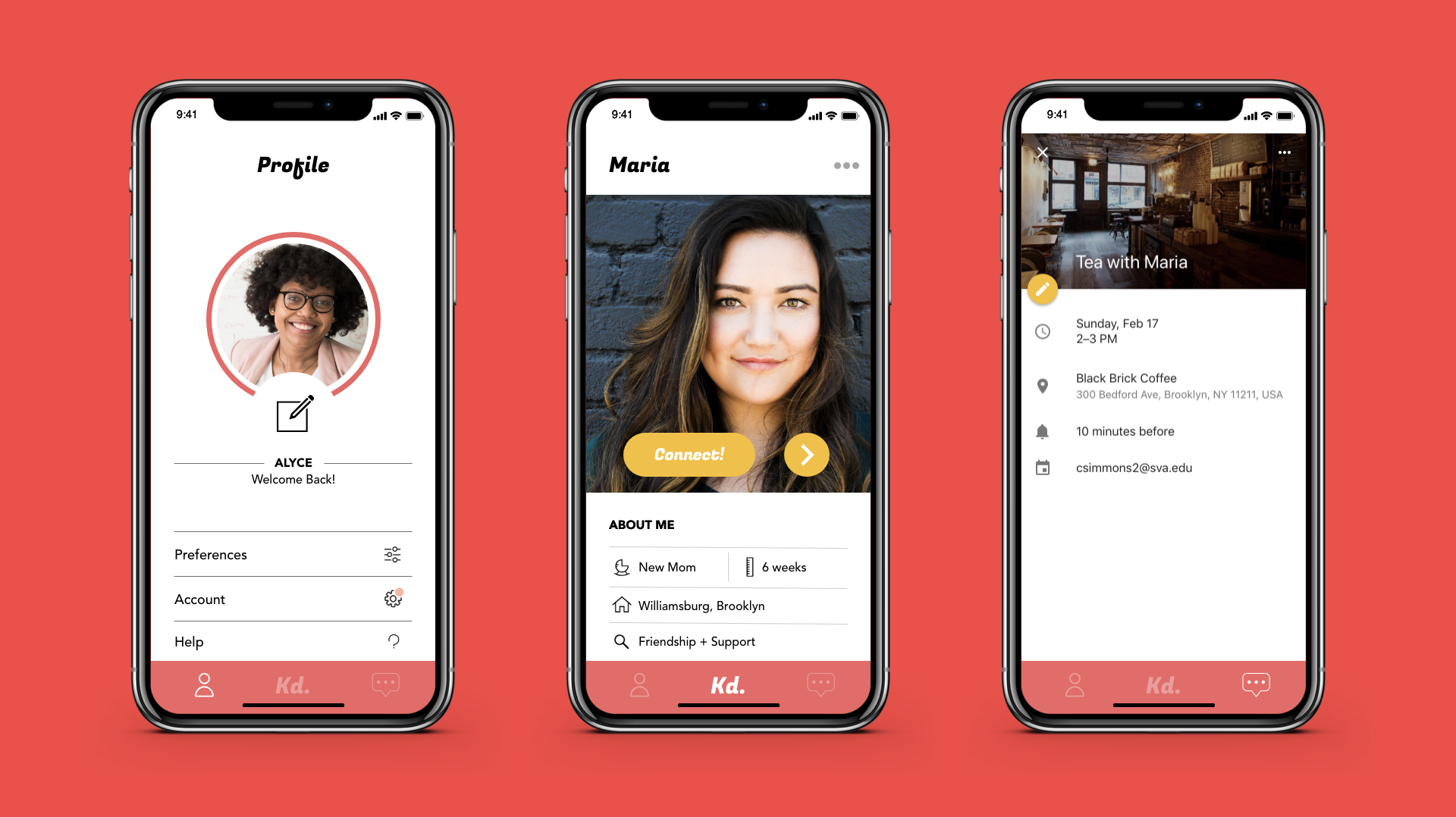If you ask Carly why she dedicated a whole thesis year to motherhood when she doesn’t see a child of her own in the future, she’d answer, “That’s precisely why. My reasons for staying childless are directly tied to the ways society treats mothers, and I have no interest in fulfilling the unrealistic expectations set for mothers.” From the start of her thesis journey, Carly sought to design a better support system for mothers. While engaging with dozens of new mothers and hearing about how quickly the field of maternal care changes, she realized, maybe mothers don’t need support — what if design could liberate them from the burdens of motherhood?
“Women, whether we like it or not, have always owned motherhood,” Carly explains. “But, the responsibilities are growing and changing, especially with the rise of technology that make tasks ‘more efficient’. There’s a huge emotional component products for moms ignore, and pressures to succeed are compounded by many new mothers living away from their families.” The Motherlode aims to redistribute care typically performed by women and mothers to other individuals in their social network. Furthermore, this thesis asks, what benefits could mothers gain from extending those networks as far as complete strangers. And, is it possible to shift from burden for one to burden for all?
“There’s a huge emotional component products for moms ignore, and pressures to succeed are compounded by many new mothers living away from their families.”
“When you have a child, your relationship with everyone around you changes, and it’s so tough to find new mom friends right after birth when you are dealing with all of it [postpartum]. ”
The village that used to take care of a child is gone, but that doesn’t mean the village is not needed. In fact, one could argue a village is needed now more than ever. With more young women moving into large cities to pursue careers, they settle away from family, a core support system for early motherhood. During a co-design workshop, a mother of two said, “When you have a child, your relationship with everyone around you changes, and it’s so tough to find new mom friends right after birth when you are dealing with all of it [postpartum].” Participants wished other mothers told them to find mom friends during pregnancy to have an established network after giving birth.
Kindred makes starting a new network of support easy by pairing mothers-to-be with other women in the same stage of pregnancy. For new mothers, specific preferences help schedule meetups around nap time and within a tight geographic location.
“In many ways, new mothers are just as clueless as their partner/spouse. There’s an opportunity for partners/spouses to gauge how each person feels about having a child and discuss their expectations for one another.”
To address changing relationships in a new mother’s life, Carly designed an experience for partners who do not have children yet, but who plan to have children in the future. Many mothers I interviewed expressed how their spouses contributed to childcare activities far less than them. In many interviews with new mothers, they expressed how hospitals didn’t prepare them or their partner/spouse for parenthood, and therefore, they carried much of the responsibility and emotional burden.
BabyTalk, a game for couples, functions as an icebreaker for having “the baby talk.” Inspired by the Gottman Method, a therapy technique for couples, the game uses a positive interaction (play) to distract players from potentially negative conversation (personal conflicts). Questions range from calling out aspects of their life they will have to give up once they have children to aspects of parenthood where they feel least confident. BabyTalk aids couples to discover emotions they haven’t spoken about and starts a dialogue about how they might approach parenting.
To expand a new mother’s support system beyond family, she designed a wearable device that allows non-pregnant humans share special moments throughout a pregnancy alongside a mother-to-be. Veli syncs to a pregnant human wearing a sensor patch and sends strong vibrations when a fetus kicks, in real time. The device aims to increase personal investment in a pregnancy and future mother for family and close friends by offering a visceral experience that connects a person to a future child.
(Prototype in progress)
“We drop women down a big hole and expect them to dig themselves out of it.”
To push the reserved nature of a social support system for new mothers in early motherhood, Carly proposes a childcare concept that defies our idea of what support could mean for moms. Ultimately, Carly asks, “For moments when moms cannot rely on their family, friends, neighbors, and coworkers, could they rely on strangers to temporarily take on some of their burden?” She argues that moms who invite strangers into their network might finally feel the relief they are searching for.
Hiatus is a new mom’s 911 call when she needs rescuing from the burden of her infant. As simple as requesting a car through Uber or Lyft, a vetted, on-call caretaker relieves a new mother within 20 minutes. One mother said perfectly, “We drop women down a big hole and expect them to dig themselves out of it." For all the mothers looking to dig themselves out, Hiatus is the personal EMS service that gives them a break when the burden becomes too much to handle.
To learn more about Carly Simmons’s work, and to see more exciting projects, visit carly-simmons.com. If you would like to ask a question, or you are interested in working with Carly, send her a note at carlyjsimmons@gmail.com.















